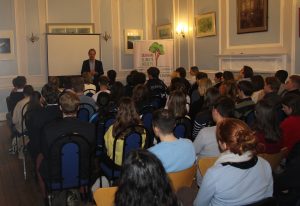Cosmo van Steenis talks with Luke Alsford about Durham University’s “moral and ethical responsibility” on climate change and how he hopes to inspire the UK’s future climate leaders.
Luke Alsford: The Climate Society was founded at the beginning of this academic year in September 2022 – why this academic year? why now?
Cosmo van Steenis: Well, so I’m a second year, so I arrived last year. There are a bunch of us who arrived and found that Durham has a lot of passionate students, in different areas of the university, who are all engaged in different groups and are doing different things on climate. The issue is that it’s very difficult to find out which group is right for you, because there are about 15 different societies that all do slightly different things around climate change, and then the other issue is that a lot of these groups don’t talk to each other. So, you have a bunch of passionate people who are really interested in getting involved in doing something, but there’s no large-scale forum in which to do that, and there’s no community to be part of. What we wanted to do was create a really centralised community hub for student engagement, information and action on climate. We wanted to do that not only working with all the different and wonderful student groups that are here, but then also starting to work with Greenspace, with different staff groups, and really starting to embed climate into the conversation around university and offer students a place to come and get inspired about climate change and then also have roots to actually getting involved in doing something about it.
LA: Your main tagline is ‘Inspiring Durham’s future climate leaders’, how do you hope to do that? Do you think that the UK’s next climate leaders can come from Durham?
CS: Yeah, I hope so! Durham students already go into some of the best workplaces on the planet. People are going into large financial consultant corporations, they’re also going to the civil service or into the public sector. So, Durham students are already going into the workforce. Our job at Climate Society is to try and get them started on the conversation about climate change. Because if a Durham student goes into one of these places and already is really passionate about sustainability, then they will start to get that conversation going in those industries, which is really important for the whole global movement towards 1.5 degrees. The way we do the inspiring of future climate leaders, is that we are offering opportunities to get involved, either by joining our exec or coming to some of our events. At these events, we host some really amazing climate leaders, such as James Close, who is the Head of Climate Change at NatWest. We also had the founders of Tred, who are wonderful and were Durham students five years ago and have now set up one of the leading sustainable banks in the UK, which was really inspiring because they are only a couple of steps ahead of where we are.
Cosmo van Steenis
LA: For a society that was only founded at the beginning of the academic year, you already have a website and have raised over £2000 in funding. How have you become such a well put-together and organised society so quickly?
CS: We started planning this in January 2022. There were a group of four of us: Me, Mima, Katie and Sophie, who all wanted to get involved. So, it’s been a lot of planning in the work and then a lot of the initial steps were made quite early on. I paid for the website – for about 10 months I was the sole funder of the society! We put a really cool Advisory Board together of a bunch of different academics across the university with some senior people like Jon Guyas [Executive Director of the Durham Energy Institute] and Harriet Bulkeley [Professor of Geography] and getting them interested in project, as well as the whole Greenspace team. Our strategy was, if we act the part and if we look like the part, then people will get involved. If the website looks really clean and professional, then we’ll get very professional speakers and we can build this Advisory Board and start from a really good founding point. By the time we launched, we had already gotten key people in the University on board and planned the events calendar for first term. We then had meetings with almost every single sustainable society on campus and talking to them trying to talk about what we were trying to do and working with them. We have partnered with as many different groups as possible. We have just held a Sustainability Fair, which will involve sixteen different sustainability groups.
LA: What motivates you personally to be involved in climate action?
CS: Climate change is the only finite issue facing the globe. It’s the biggest existential threat ever to humanity and it is the most important discussion that’s going to happen in the next twenty years. So, it’s something I really want to be involved in. But as troubling and terrifying as climate change is, I also think it offers really cool opportunities for developing more harmony between each other and also between us and nature. Also, some of the greatest minds in the world are working on climate issues as we speak, and there is a bunch of cool research and pioneering work being done on climate, especially at this university – four professors were at COP27. It is really cool to be part of a movement that’s building momentum and that’s capable of creating such a huge cultural shift, which is going to have to happen if we need it.
LA: To go back to climate leadership, do you consider that your work with the society is climate leadership? What does climate leadership look like?
CS: As an exec, we talk a lot about how we function as a team. I think that the most important thing that is that we’re all collaborating and we have a really clear vision and agenda of how we do that. If we as an exec are harmonious, friendly and compassionate to each other, then that can start to extend outwards. I think climate leadership can be started by individuals, but actually, what climate leadership really is, is a bunch of individuals joining part of the whole group. As a group, I think we’re really trying to set the tone and set a vision for other students to then get involved with and come on board with. I think then the more collective leadership we can have, then the greater collective response we can have. I’m not terribly interested in individual leadership to be honest. I can do a lot myself, but I but if I’m not working with a bunch of people, then nothing’s going to happen. The only way we’re going to solve the issue is by creating a really collective response.
The Climate Society’s Q&A event with James Close, Head of Climate at NatWest
LA: To focus on the Durham-side of things. I have seen on your Instagram that the Vice-President says that Durham University does have an impressive record on climate change. Do you think that Durham University is a relevant institution to have this climate activism to be going on?
CS: That’s a very on-topic conversation! I was just at the launching of Durham’s new biodiversity strategy. Durham is one of the best universities in the UK and it’s a place where a lot of students come to, and so it has a moral and ethical responsibility to start to really set the agenda around climate change and start being a leading force on it. It has already done quite a lot of good stuff, so for example in the People and Planet University League table, we’ve jumped up from being down near a third, about three years ago to being a 2:1 now. Simon Park and the whole team at Greenspace have done an amazing job of getting us to that point. There is also a huge amount of climate related research going in different departments. The issue is none of them are talking to each other and the other issue is that the publicity around it is really bad, so student engagement and student awareness of a lot of these things, is not very high. For instance, I didn’t know there were four professors going to COP, until about 2 weeks before we did our COP debrief thing, which is ridiculous, right? We’re one of the few universities in the world to be granted observer status, it’s a pretty phenomenal thing. So, I think what Durham needs to do is start to approach this from a united front. We need to start to create harmony between focusing on the areas of research, student engagement, infrastructure concerns, because that’s the only way that you’re going to start to really create change. The new Pro-Vice Chancellor Karen [O’Brien] is amazing on this and is really supportive of the agenda, and they’re having a strategy refresh where they’re going to completely rethink their sustainability strategy, which we very useful. I think we need to start developing better government structures. At the moment there are a bunch of different committees which sit below the University Executive Committee. I’m the student rep on the Environmental Sustainability Strategic Planning Group, which focuses on operations and is not really at all tied to research. What we really need is one unified committee to really start to push the agenda towards the front.
Read part two here
Featured Image: Cosmo van Steenis


